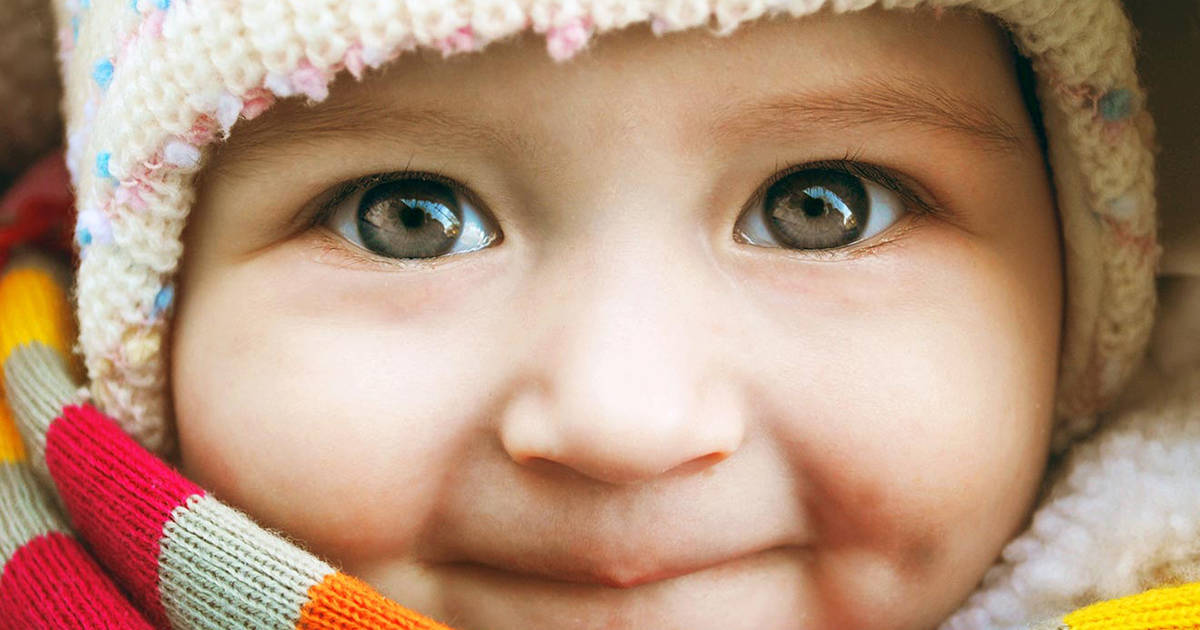Your baby's eyesight development: Infant vision timeline

One of the greatest moments in life is the first time your newborn child opens their eyes and makes eye contact with you.
But don't be concerned if that doesn't happen right away. The visual system of a newborn infant takes some time to develop.
In the first week of life, babies don't see much detail. Their first view of the world is indistinct and only in shades of grey.
It takes several months for your child's vision to develop fully after birth. Knowing the milestones of infant vision development (and what you can do to help them along) can ensure your child is seeing normally and enjoying their world to the fullest.
Vision development starts during pregnancy
Your child's vision development begins before birth. How you care for your own body during your pregnancy is extremely important for the development of your baby's body and mind, including their eyes and the vision centres in their brain.
Be sure to follow the instructions your physician gives you regarding proper nutrition, including supplements, and the proper amount of rest you need during your pregnancy.
Avoid smoking and consuming alcohol or drugs during pregnancy, as these toxins can cause multiple problems for your baby, including serious vision problems.
Smoking is particularly hazardous during pregnancy, as cigarette smoke contains an estimated 3,000 different chemicals that can potentially harm humans — including carbon monoxide, a known foetal toxin.

Even taking common medications like aspirin can be dangerous to your baby when you are pregnant, increasing the risk of low birth weight and problems during delivery. Low birth weight has been associated with an increased risk of vision problems in infants.
Always talk to your physician before taking any medications during your pregnancy, including over-the-counter medicines, herbal supplements and other non-prescription remedies.
Vision development at birth
Soon after birth, your doctor or nurse will briefly examine your infant's eyes to rule out signs of congenital cataracts or other serious neonatal eye problems.
Though such eye problems are rare, they must be detected and treated early to minimise their impact on your child's vision development.
Also, an antibiotic ointment usually is applied to your newborn's eyes to help prevent an eye infection from bacteria and other microorganisms that may be present in the birth canal. Preventing early eye infections is essential for normal visual development.
At birth, your baby sees only in black and white and shades of grey. This is because nerve cells in the retina and brain that control colour vision are not fully developed.
Also, a newborn infant's eyes don't have the ability to focus on near objects (accommodate). So, don't be concerned if your baby doesn't seem to be "focusing" on objects, including your face, right away. It takes some time for this visual skill to develop.
Despite these visual limitations, studies show that within a few days after birth, infants prefer looking at an image of their mother's face than the face of a stranger.
Researchers believe this preference depends on large, high-contrast stimuli, like the boundary of the mother's hairline to her face. (In studies, if these boundaries were masked with a scarf or bathing cap, the infants' preference of looking at their mother's face went away.)
Therefore, to encourage visual interaction with your newborn child, keep your hair style the same, and avoid altering your appearance during your baby’s first few weeks of life.
Another thing you may notice about your newborn baby is how large their eyes soon appear. This is because normal infant development proceeds from the head down. At birth, your baby's eyes are already 65 percent of their adult size!
Your baby's eyes in the first month
Your baby's eyes are not very sensitive to light in the first month of life. In fact, the amount of light a 1-month-old infant needs to be aware that light is present (called light detection threshold) is 50 times higher than that of an adult.
It's OK to leave some lights on in the nursery — this won't typically affect your baby’s ability to sleep — and it may help keep you from stubbing your toes on furniture when you go in to the room at night to check on them!
Infants start to develop the ability to see in colours very quickly. At one week after birth, they can see red, orange, yellow and green. But it takes a little longer for them to be able to see blue and violet. This is because blue light has shorter wavelengths, and fewer colour receptors exist in the human retina for blue light.
And don't be too concerned if your baby's eyes sometimes don't appear to be working together as a team early on. One eye may occasionally drift inward or outward from proper alignment. This is normal. But if you see a large and constant misalignment of their eyes, consult an optician right away.
Tips: To help stimulate your infant's vision, decorate their room with bright, cheerful colours. Include artwork and furnishings with contrasting colours and shapes. Also hang a brightly coloured mobile above or near their cot. Make sure it has a variety of colours and shapes.
Vision development: Months 2 and 3
Many advances in vision development take place in months two and three. Infants develop sharper visual acuity during this period, and their eyes are beginning to move better as a team. Your child should be following moving objects at this stage and starting to reach for things they see.

A bright, cheerful room with many colours and shapes helps stimulate your infant's vision development.
Also, infants at this stage of development are learning how to shift their gaze from one object to another without having to move their head. And their eyes are becoming more sensitive to light: at 3 months old, an infant's light detection threshold is decreasing. So you may want to dim the lights a bit more for naps and bedtime.
Tips: To help stimulate your 2- to 3-month-old child's vision development:
Add new objects to his room or frequently change the location of his cot so they see new things.
Keep a night light on to provide visual stimulation when they are awake in their cot.
While infants should be placed on their backs for sleep to decrease the risk of sudden infant death syndrome (SIDS), put them on their stomachs when they are awake and you can supervise them. This position can provide important visual and motor experiences.
Vision development: Months 4 to 6
By 6 months of age, significant advances have taken place in the vision centres of the brain, allowing your infant to see more distinctly and move their eyes quicker and more accurately to follow moving objects.
Visual acuity improves from about 20/400 (6/120) at birth to approximately 20/25 (6/7.5) at 6 months. Colour vision should be similar to that of an adult as well, enabling your child to see all the colours of the rainbow.
Babies also have better eye-hand coordination at 4 to 6 months of age, allowing them to quickly locate and pick up objects and accurately direct a bottle (and many other things!) to their mouths.
Six months is an important milestone as this is when you should be thinking about your child's first eye exam.
A qualified optometrist can examine a child as young as 6 months if necessary but usually they will start to recommend routine eye examinations at around school age (3/4 years+)
If you have any concerns you can also speak to your GP or health visitor who can recommend the next step to take
For the most thorough eye exam for your 6-month-old, seek the services of an optician who specialises in children's vision and vision development.
Vision development: Months 7 to 12
Your child is now mobile, crawling about and covering more distance than you could ever have imagined. They are better at judging distances and more accurate at grasping and throwing objects. (Look out!)
This is an important developmental period for your child. At this stage, infants are developing a better awareness of their overall body and are learning how to coordinate their vision with their body movements.
It's also a time that requires greater diligence on your part to keep your baby from harm. Bumps, bruises, eye injuries and other serious injuries can occur as they begin to physically explore their environment.
For example, keep cabinets that contain cleaning supplies locked, and put barriers in front of staircases.
Don't be concerned if your infant's eyes are beginning to change colour. Most babies are born with blue eyes because darker pigments in the iris aren't completely developed at birth. Over time, more dark pigment is produced in the iris, which will often change your child's eye colour from blue to brown, green, grey or a mixture of colours, as in hazel eyes.
Tips: To stimulate the development of your child's eye-hand-body coordination, get down on the floor with them and encourage them to crawl to objects. Place a favourite toy on the floor just out of their reach and encourage them to get it. Also, provide plenty of objects and toys that they can take apart and put together.
Eye alignment problems
Be sure to pay close attention to how well your baby's eyes work together as a team. Strabismus is the term for a misalignment of the eyes, and it is important that it is detected and treated early so the vision in both eyes develops properly.
Left untreated, strabismus can lead to amblyopia or "lazy eye."
Though it takes a few months for an infant's eyes to develop eye teaming skills, if you feel one of your baby's eyes is misaligned constantly or does not move in synch with the other eye, consult an optician as soon as possible.
Vision problems of premature babies
The average length of a normal pregnancy is approximately 40 weeks (280 days). According to the World Health Organization, babies born before 37 weeks of gestation are considered premature.
Premature babies are at greater risk of eye problems than full-term babies, and the odds increase the earlier the child is born.
Vision problems associated with premature birth include:
Retinopathy of prematurity (ROP)
This is the abnormal replacement of normal tissue in the retina with fibrous tissue and blood vessels. ROP can cause scarring of the retina, poor vision and retinal detachment. In severe cases, retinopathy of prematurity can cause blindness.
All premature babies are at risk of ROP. Very low birth weight is an additional risk factor, especially if it is necessary to place the infant in a high-oxygen environment immediately after birth.
If your baby is born prematurely, ask your obstetrician to refer you to a paediatric ophthalmologist so he or she can examine your child’s eyes to rule out ROP.
Nystagmus
This is an involuntary, back-and-forth movement of both eyes.
In most cases, nystagmus causes the eyes to drift slowly in one direction and then "jump" back in the other direction. The eye movements are usually horizontal, but they can be diagonal or rotational as well.
Nystagmus can be present at birth, or it may develop weeks to months later. Risk factors include incomplete development of the optic nerve, albinism and congenital cataracts. The magnitude of the eye movements will usually determine how much the baby's vision and visual development will be affected.
If your baby shows signs of nystagmus, consult an optician immediately.
Finally, be aware that smoking while pregnant significantly increases the risk of giving birth prematurely.
CONCERNED ABOUT YOUR BABY'S VISION? Find an optician near you.
Page published on Thursday, 27 June 2019






